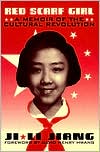December 2010 — Change is Inevitable
As 2010 closes, we reflect upon the past and plan for the future. We cannot help but notice that things change. It is inescapable and, thus, WOW Books December theme: “Change is Inevitable.” Narratives chronicling war, especially amidst the European Holocaust, show how change can be unimaginably dramatic. They tear at us, engrossing us in ways to challenge our thinking and expand our knowledge and concept of historical accuracy beyond textbook reductions. They depict changes in the human landscape, changes in cultural locations, changes in historical remembrances, and changes in human hearts. They are poignant, passionate, and ultimately persuasive. Change brings suffering often trumped by hope.
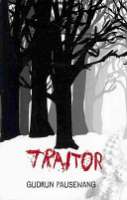 It’s easy to make choices when the consequences are minimal. However, in our final book of December, Traitor by Gudrun Pausewang, a fifteen year old girl faces a choice in the closing months of World War II, as she must decide whether or not to help an escaped Russian prisoner of war, despite the serious repercussions if she does so.
It’s easy to make choices when the consequences are minimal. However, in our final book of December, Traitor by Gudrun Pausewang, a fifteen year old girl faces a choice in the closing months of World War II, as she must decide whether or not to help an escaped Russian prisoner of war, despite the serious repercussions if she does so.
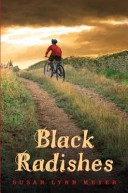 WOW Books chose Black Radishes for its fourth book in December. Susan Lynn Meyer, inspired by her father’s experiences as a Jewish child, takes us to 1940 France. Gustave and his family, for their safety, must leave Paris. They settle in Saint-Georges, a small village in French countryside, planning to escape when Gustav joins the resistance.
WOW Books chose Black Radishes for its fourth book in December. Susan Lynn Meyer, inspired by her father’s experiences as a Jewish child, takes us to 1940 France. Gustave and his family, for their safety, must leave Paris. They settle in Saint-Georges, a small village in French countryside, planning to escape when Gustav joins the resistance.
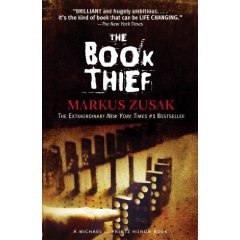 WOW Book’s mid-December selection, The Book Thief, by Markus Zusak, weaves a stunning tale: Death as the narrator, a child who steals books (even though initially she can’t read), a setting of WWII Nazi Germany, and lives that are profoundly changed in the process. Add your comments.
WOW Book’s mid-December selection, The Book Thief, by Markus Zusak, weaves a stunning tale: Death as the narrator, a child who steals books (even though initially she can’t read), a setting of WWII Nazi Germany, and lives that are profoundly changed in the process. Add your comments.
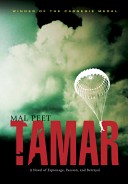 Even after sixty-five years, it seems that every week there are still new stories uncovered about WWII. In that sense, our second selection mirrors reality. Tamar, named by her grandfather, finds a box of his from WWII. The contents propel her on a journey to discover their meaning. Enjoy the Carnegie Medal award winner Tamar: A Novel of Espionage, Passion, and Betrayal.
Even after sixty-five years, it seems that every week there are still new stories uncovered about WWII. In that sense, our second selection mirrors reality. Tamar, named by her grandfather, finds a box of his from WWII. The contents propel her on a journey to discover their meaning. Enjoy the Carnegie Medal award winner Tamar: A Novel of Espionage, Passion, and Betrayal.
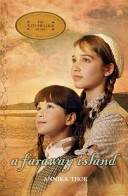 Annika Thor, in A Faraway Island, began our December selections. In 1938, Stephie and Nellie, two Austrian Jewish sisters, are sent to Sweden to escape the Nazi regime while their parents remain behind. They settle on an island off the coast of Sweden with separate foster parents. Each reacts to the experience in dramatically different ways. Share your thoughts about A Faraway Island in our comment section.
Annika Thor, in A Faraway Island, began our December selections. In 1938, Stephie and Nellie, two Austrian Jewish sisters, are sent to Sweden to escape the Nazi regime while their parents remain behind. They settle on an island off the coast of Sweden with separate foster parents. Each reacts to the experience in dramatically different ways. Share your thoughts about A Faraway Island in our comment section.
November 2010 — Peaceful Acts in the Midst of Conflict
Peaceful Acts in the Midst of Conflict is the focus of WOW Books for November. Last month we focused on the tragic stories of war and conflict in our world. This month WOW Books will emphasize books that shine a light on how individuals have courageously striven to combat conflicts with peaceful actions. The books spotlighted this month chronicle stories that will encourage children to become peacemakers.
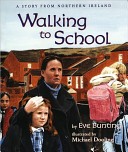 Lastly, in November, we highlighted Walking to School by Eve Bunting. This picture book focuses on the religious conflict in Northern Ireland. Allison, who is Catholic, recognizes a Protestant girl’s kindness and concludes, “I think we could be friends…. If the grownups would let us.”
Lastly, in November, we highlighted Walking to School by Eve Bunting. This picture book focuses on the religious conflict in Northern Ireland. Allison, who is Catholic, recognizes a Protestant girl’s kindness and concludes, “I think we could be friends…. If the grownups would let us.”
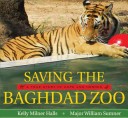 Casualties in war are often those who are the most dependent on others. One such case during the Iraq war were animals, caged and abandoned, when their keepers fled. Exotic ones were stolen and others languished in neglect. Kelly Milner Halls tells the story of their rescue in our third book for November in Saving the Baghdad Zoo: A True Story of Hope and Heroes.
Casualties in war are often those who are the most dependent on others. One such case during the Iraq war were animals, caged and abandoned, when their keepers fled. Exotic ones were stolen and others languished in neglect. Kelly Milner Halls tells the story of their rescue in our third book for November in Saving the Baghdad Zoo: A True Story of Hope and Heroes.
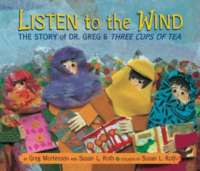 Our second selection was Listen to the Wind: The Story of Dr. Greg and Three Cups of Tea by Greg Mortenson. Lost and exhausted while climbing the second highest peak in the world, Mortenson arrives at a small village in Pakistan. The villagers help nurse him back to health. In turn, he promises to build a school – no easy task in that mountainous region. It doesn’t take much to make a difference, though.
Our second selection was Listen to the Wind: The Story of Dr. Greg and Three Cups of Tea by Greg Mortenson. Lost and exhausted while climbing the second highest peak in the world, Mortenson arrives at a small village in Pakistan. The villagers help nurse him back to health. In turn, he promises to build a school – no easy task in that mountainous region. It doesn’t take much to make a difference, though.
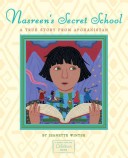 When, in our first selection of November, Nasreen’s parents in Afghanistan disappear, Nareen simply withdraws. Jeannette Winter in Nasreen’s Secret School: A True Story From Afghanistan shares the story of her emergence with the help of a secret school run by inspiring and courageous individuals in a private home.
When, in our first selection of November, Nasreen’s parents in Afghanistan disappear, Nareen simply withdraws. Jeannette Winter in Nasreen’s Secret School: A True Story From Afghanistan shares the story of her emergence with the help of a secret school run by inspiring and courageous individuals in a private home.
October 2010 — Violent Change
October’s edition of WOW Books focuses on children’s voices as they grapple with fanatical and violent political upheaval. Join Wow Books as it explores how children respond when a safe and predictable world unexpectedly turns upside down to them.
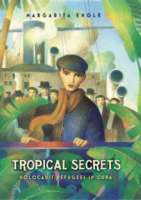 In the final week of October we focused on Tropical Secrets: Holocaust Refugees in Cuba, by Margarita Engle. While many books on the Holocaust focus on events in Germany, others focus on the refugee experience that those who managed to escape endure. Tropical Secrets: Holocaust Refugees in Cuba takes the reader on a journey to one of the lesser known stories of the Holocaust.
In the final week of October we focused on Tropical Secrets: Holocaust Refugees in Cuba, by Margarita Engle. While many books on the Holocaust focus on events in Germany, others focus on the refugee experience that those who managed to escape endure. Tropical Secrets: Holocaust Refugees in Cuba takes the reader on a journey to one of the lesser known stories of the Holocaust.
On the third Wednesday of October we focused on The Red Scarf Girl, by Ji-li Jiang, as she details the nightmare she experienced under Mao’s Cultural Revolution. As a child of the “revolution” she was placed in the unenviable position of choosing between her family and her future.
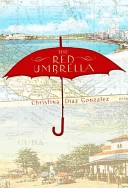 We continued October with our second selection, The Red Umbrella, by Christina Diaz Gonzalez. Lucîa, 14, and her family suffer through the Cuban political revolution of 1961. Her safe, predictable, and happy school life is violently threatened. Recognizing the danger, her parents arrange to send her to safety in Nebraska. There she must adjust to her new culture, all the while hearing only veiled snippets about home and family.
We continued October with our second selection, The Red Umbrella, by Christina Diaz Gonzalez. Lucîa, 14, and her family suffer through the Cuban political revolution of 1961. Her safe, predictable, and happy school life is violently threatened. Recognizing the danger, her parents arrange to send her to safety in Nebraska. There she must adjust to her new culture, all the while hearing only veiled snippets about home and family.
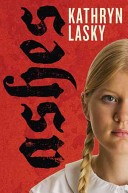
We start October with Ashes by Kathryn Lasky. Lasky tackles the period of the early 1930’s in Germany and the corresponding rise of Hitler. Gabriella, while from a privileged family, must face the reality of a safe, secure, and predictable world suddenly crumbling before her eyes.
September 2010 — Bilingual Books
This month WOW Books is focusing on bilingual books. These books offer a great opportunity for children to learn not only about literature but also about language. Each of the books to be introduced this month invites the reader to relish the magic of language and words, particularly the magic of bilingualism.
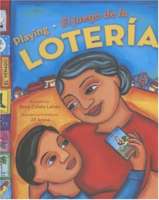 Our final book in September was Playing Loteria / El Juego De La Loteria, by Rene Colato Lainez and Jill Arena. This charming book explores the world of a child as he and his grandmother try to not only bridge two cultures, but two languages as well.
Our final book in September was Playing Loteria / El Juego De La Loteria, by Rene Colato Lainez and Jill Arena. This charming book explores the world of a child as he and his grandmother try to not only bridge two cultures, but two languages as well.
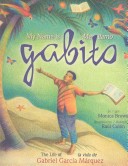 Our third book was My Name is Gabito, by Monica Brown, not only introduces children to the gifted writer Gabriel Garcia Marquez. “When Gabito grew up,” Brown writes, “he wrote the most exciting stories in the world. His stories were magical and amazing, but just as real as you or me.”
Our third book was My Name is Gabito, by Monica Brown, not only introduces children to the gifted writer Gabriel Garcia Marquez. “When Gabito grew up,” Brown writes, “he wrote the most exciting stories in the world. His stories were magical and amazing, but just as real as you or me.”
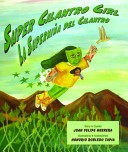 Our second September offering was Super Cilantro Girl/La Superniña del Cilantro, by Juan Felipe Herrera and illustrated by Honorio Robleda Tapia. The book relates the tale of Esmeralda’s fantasy rescue of her mom. Yet, all the while, the book gently explores immigrant identity along the border.
Our second September offering was Super Cilantro Girl/La Superniña del Cilantro, by Juan Felipe Herrera and illustrated by Honorio Robleda Tapia. The book relates the tale of Esmeralda’s fantasy rescue of her mom. Yet, all the while, the book gently explores immigrant identity along the border.
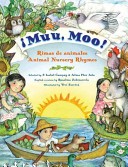 Our first book for August is Muu, Moo! In the bilingual book !Muu, Moo! Rimas de animales/Animal Nursery Rhymes, Alma Flor Ada, Isabel Campoy and Rosalma Zubizarreta have done an outstanding job on offering readers verses that keep the playful use of sounds, rhymes and alliterations in both Spanish and English.
Our first book for August is Muu, Moo! In the bilingual book !Muu, Moo! Rimas de animales/Animal Nursery Rhymes, Alma Flor Ada, Isabel Campoy and Rosalma Zubizarreta have done an outstanding job on offering readers verses that keep the playful use of sounds, rhymes and alliterations in both Spanish and English.
August 2010 — Micro-finance
WOW Books chose the unusual theme of micro-finance. People often wonder how they can make a difference solving some of the world’s insurmountable problems. Four books highlight how a seemingly small gift blossoms into something special.

July 2010 — The Importance of Friendship
During July we spotlighed recently published books that focus on the importance friendship in overcoming difficult obstacles and building relationships.
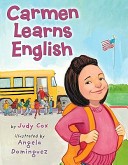 Our final book for July was Carmen Learns English by Judy Cox. Carmen, a Spanish only speaker, is getting ready for the first day of school where she knows nearly everyone speaks English. Naturally, she is apprehensive. The story deals with the issue in a sensitive fashion, but Carmen Learns English raises other, serious questions to consider.
Our final book for July was Carmen Learns English by Judy Cox. Carmen, a Spanish only speaker, is getting ready for the first day of school where she knows nearly everyone speaks English. Naturally, she is apprehensive. The story deals with the issue in a sensitive fashion, but Carmen Learns English raises other, serious questions to consider.
 Our third book for July is The Chicken Thief by Béatrice Rodriguez. This story starts like any chicken and fox story. The fox snatches a chicken. Ho, hum. This, however, is not a normal story. Not only does the plot take some unexpected turns, but the entire story is told without words. Click on the link and tell us what you think of The Chicken Thief.
Our third book for July is The Chicken Thief by Béatrice Rodriguez. This story starts like any chicken and fox story. The fox snatches a chicken. Ho, hum. This, however, is not a normal story. Not only does the plot take some unexpected turns, but the entire story is told without words. Click on the link and tell us what you think of The Chicken Thief.
 Our second book for July was Numbers by Rachel Ward. Jem has a frightening “gift” with numbers. As she isolates from everyone, she meets a young man, Spider, who “pesters” himself into her life. As she lets one person into her life, events take a most unexpected turn. Join our discussion of Numbers.
Our second book for July was Numbers by Rachel Ward. Jem has a frightening “gift” with numbers. As she isolates from everyone, she meets a young man, Spider, who “pesters” himself into her life. As she lets one person into her life, events take a most unexpected turn. Join our discussion of Numbers.
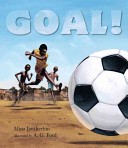
Our first book for July was Goal! by Mina Javaherbin. In a setting where children will use anything round to play soccer, obtaining a “real” ball is both an occasion for celebration and worry, “The streets are not safe here.” Please join the discussion of Goal!
June 2010 — Books Depicting Hardships In June we are highlighting books that depict characters struggling with and overcoming hardships.
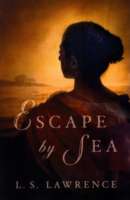 For the first week of June, WOW Books highlighted Escape by Sea, by L.S. Lawrence. This coming-of-age adventure that starts in ancient Carthage provides fascinating details about what life was like then on the Mediterranean and raises questions about tolerance, morality, and diversity.
For the first week of June, WOW Books highlighted Escape by Sea, by L.S. Lawrence. This coming-of-age adventure that starts in ancient Carthage provides fascinating details about what life was like then on the Mediterranean and raises questions about tolerance, morality, and diversity.
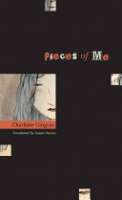 In week two, WOW Books features Pieces of me by Charlotte Gingras. Join us and add your thoughts on this coming of age story following Mirabelle, a talented artist from a broken home, whose confidence may be shattered just as she’s found it.
In week two, WOW Books features Pieces of me by Charlotte Gingras. Join us and add your thoughts on this coming of age story following Mirabelle, a talented artist from a broken home, whose confidence may be shattered just as she’s found it.
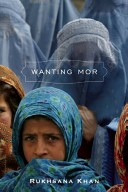 Our third WOW Books feature for the month is Wanting Mor by Rukhsana Khan. Tell us your thoughts about this book, inspired by a true story, following the life of an Afghan girl with a cleft palate who experienced the death of her mother and abandonment by her father. Wanting Mor was also examined in depth for WOW Review.
Our third WOW Books feature for the month is Wanting Mor by Rukhsana Khan. Tell us your thoughts about this book, inspired by a true story, following the life of an Afghan girl with a cleft palate who experienced the death of her mother and abandonment by her father. Wanting Mor was also examined in depth for WOW Review.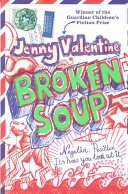
The fourth selection in WOW Books for June focuses on a family struggling to cope with loss in Broken Soup, by Jenny Valentine. As Rowan’s parents are paralyzed with the death of her brother, she must face new challenges, responsibilities, and a mysterious friend. Post your comments on Broken Soup.
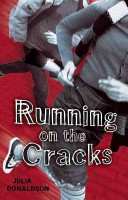
Our final selection for the month of June is Running on the Cracks. Julia Donaldson’s Chinese-English character, Leo, loses her parents and runs away from an unpleasant situation with her aunt in search of her Chinese grandparents. The story, set in Scotland, is interestingly told through the different perspectives of characters in the story. Share your thoughts on Running on the Cracks with us.
May 2010 –- Talking About Home In May we discuss books that start young children on the journey of understanding their world and talking, drawing, and writing about their own experiences. The stories, showing children playing or interacting with their families, invite them to talk about their own lives. It’s a circular process: children read stories like these, they think about their own homes, and they talk and write stories about their own lives.
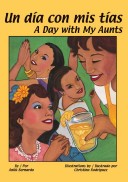 Our second book of the month is Un Día Con Mis Tías/ A Day With My Aunts, in both English and Spanish, by Anilú Bernardo and illustrated by Christina Rodriguez. For Isabel, Saturday is a special day of the week as she visits her three aunts. Enveloped in their love, she is the focus of their day as they cook, encourage her to “dress-up,” and dance.
Our second book of the month is Un Día Con Mis Tías/ A Day With My Aunts, in both English and Spanish, by Anilú Bernardo and illustrated by Christina Rodriguez. For Isabel, Saturday is a special day of the week as she visits her three aunts. Enveloped in their love, she is the focus of their day as they cook, encourage her to “dress-up,” and dance.
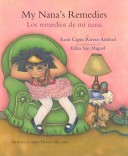 Our first book is My Nana’s Remedies / Los remedios de mi nana, written in both English and Spanish, by Roni Capin Rivera-Ashford and illustrated by Edna San Miguel. The book develops two themes simultaneously. One follows a grandmother as she treats the family with various traditional herbal remedies while the other celebrates the love between grandparent and grandchild.
Our first book is My Nana’s Remedies / Los remedios de mi nana, written in both English and Spanish, by Roni Capin Rivera-Ashford and illustrated by Edna San Miguel. The book develops two themes simultaneously. One follows a grandmother as she treats the family with various traditional herbal remedies while the other celebrates the love between grandparent and grandchild.
April 2010 — Illustrations 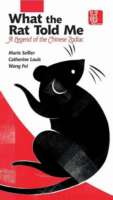 Throughout April we focus on how illustrations enhance, inform, and extrapolate from the text.
Throughout April we focus on how illustrations enhance, inform, and extrapolate from the text.
Our first illustrated book, What the Rat Told Me, is illustrated by the critically acclaimed team of author, illustrator, and calligrapher who created The Legend of the Chinese Dragon — by Wang Fei, Catherine Louis, and Marie Sellier. This porquois tale, tells the story of how the animals of the Chinese zodiac were assigned.
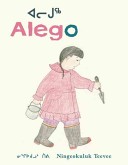 Our second illustrated book, Alego comes from a rising star of the famed Cape Breton Inuit art scene, author and illustrator Ningeokuluk Teevee, who draws on her own childhood experiences in the Arctic for this enchanting introduction to the life of an Inuit girl and her world.
Our second illustrated book, Alego comes from a rising star of the famed Cape Breton Inuit art scene, author and illustrator Ningeokuluk Teevee, who draws on her own childhood experiences in the Arctic for this enchanting introduction to the life of an Inuit girl and her world.
 Our third book, My Little Round House, illustrated by a young Mongolian author/illustrator, reveals a world very different, and yet surprisingly similar, to that of young readers and their parents.
Our third book, My Little Round House, illustrated by a young Mongolian author/illustrator, reveals a world very different, and yet surprisingly similar, to that of young readers and their parents.
 Our final book for the month of April, Imaginary Garden , written by Andrew Larsen and illustrated by Irene Luxbacher, relates the story of a grandfather who relocates to an apartment with only a small balcony and is visited by his granddaughter. Missing his old house and its garden, the two create a vibrant space to celebrate what is missing.
Our final book for the month of April, Imaginary Garden , written by Andrew Larsen and illustrated by Irene Luxbacher, relates the story of a grandfather who relocates to an apartment with only a small balcony and is visited by his granddaughter. Missing his old house and its garden, the two create a vibrant space to celebrate what is missing.
March 2010 — Books by Authors & Illustrators Featured at the Tucson Festival of Books 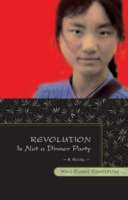 During March we focus on books written by authors who will be attending the second annual Tucson Festival of Books at the UA campus March 13-14, 2010. To learn more about the festival and all the authors and illustrators who will be attending visit the TFOB Web site.
During March we focus on books written by authors who will be attending the second annual Tucson Festival of Books at the UA campus March 13-14, 2010. To learn more about the festival and all the authors and illustrators who will be attending visit the TFOB Web site.
Our first book for March is Revolution Is Not a Dinner Party by Ying Chang Compestine. Drawing from her childhood experience, Compestine brings hope and humor to this compelling story for all ages about a girl fighting to survive during the Cultural Revolution in China.
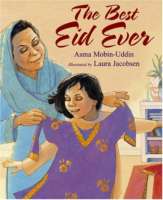 Our second Tucson Festival of Books author for March is Asma Mobin-Uddin and the picture book, The Best Eid Ever. In this story, Aneesa comes up with a plan to help two sisters, refugees with no new clothes in which to celebrate Eid, and make it the best holiday for everyone.
Our second Tucson Festival of Books author for March is Asma Mobin-Uddin and the picture book, The Best Eid Ever. In this story, Aneesa comes up with a plan to help two sisters, refugees with no new clothes in which to celebrate Eid, and make it the best holiday for everyone.
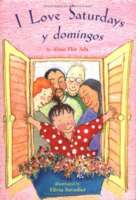 Our third Tucson Festival of Books author for March is Alma Flor Ada and the picture book, I Love Saturdays y Domingos, illustrated by Elivia Savadier. In this story, Saturdays and Sundays are very special days. On Saturdays, she visits Grandma and Grandpa, who come from a European-American background, and on Sundays — los domingos — she visits Abuelito y Abuelita, who are Mexican-American.
Our third Tucson Festival of Books author for March is Alma Flor Ada and the picture book, I Love Saturdays y Domingos, illustrated by Elivia Savadier. In this story, Saturdays and Sundays are very special days. On Saturdays, she visits Grandma and Grandpa, who come from a European-American background, and on Sundays — los domingos — she visits Abuelito y Abuelita, who are Mexican-American.
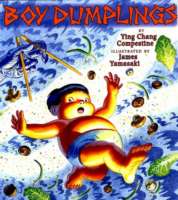 For our final Tucson Festival of Books author for March, we return to Ying Chang Compestine and the picture book, Boy Dumplings, illustrated by James Yamasaki. In this story, a boy is the intended dinner for a hungry ghost and the boy knows the perfect recipe. As he sends the ghost all over China gathering various ingredients for boy dumplings, he will either escape or become dinner.
For our final Tucson Festival of Books author for March, we return to Ying Chang Compestine and the picture book, Boy Dumplings, illustrated by James Yamasaki. In this story, a boy is the intended dinner for a hungry ghost and the boy knows the perfect recipe. As he sends the ghost all over China gathering various ingredients for boy dumplings, he will either escape or become dinner.
February 2010 — Books about War 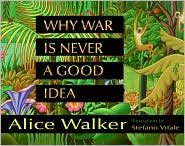
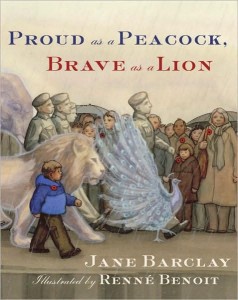 Our second war-themed book is Proud as a Peacock, Brave as a Lion written by Jane Barclay and illustrated by Renné Benoit. As questions come from a young grandchild in this book, his grandpa talks about how, as a very young man, he was as proud as a peacock in uniform, busy as a beaver on his Atlantic crossing, and brave as a lion charging into battle.
Our second war-themed book is Proud as a Peacock, Brave as a Lion written by Jane Barclay and illustrated by Renné Benoit. As questions come from a young grandchild in this book, his grandpa talks about how, as a very young man, he was as proud as a peacock in uniform, busy as a beaver on his Atlantic crossing, and brave as a lion charging into battle.
In our third week looking at books on war, we feature A Long Way Gone: Memoirs of a Boy Soldier, written by Ishmael Beah. In this book, Beah, now twenty-five years old, tells a riveting story: how at the age of twelve, he fled attacking rebels and wandered a land rendered unrecognizable by violence. By thirteen, he’d been picked up by the government army, and Beah, at heart a gentle boy, found that he was capable of truly terrible acts.
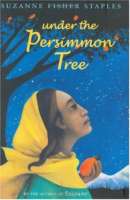 Our final look at books on war for February takes us Under the Persimmon Tree with intertwined portraits of courage and hope in Afghanistan and Pakistan. In this novel by Suzanne Fisher Staples, Najmah seeks refuge and hopes to find her father and brother by taking the perilous journey through the mountains to cross the border into Pakistan while Nusrat’s persimmon-tree school awaits Najmah’s arrival. Together, they seek their way home.
Our final look at books on war for February takes us Under the Persimmon Tree with intertwined portraits of courage and hope in Afghanistan and Pakistan. In this novel by Suzanne Fisher Staples, Najmah seeks refuge and hopes to find her father and brother by taking the perilous journey through the mountains to cross the border into Pakistan while Nusrat’s persimmon-tree school awaits Najmah’s arrival. Together, they seek their way home.
January 2010 – Controversial Books For the month of January, we are focusing on controversial books. Frequently a book is considered controversial when a character indulges in behavior that is beyond what most people consider moral or ethical to the point that discussion of the subject is uncomfortable at best. Because we object to human trafficking, violence, or illegal behavior, educators read with an additional lens when considering such books for use in the classroom — and sometimes that process leads to censorship. In determining appropriate books for students, we must still demonstrate acceptance of our national diversity and an understanding of the realities of the world at large.

Week two we feature Sunrise Over Fallujah by Walter Dean Myers. Civil affairs soldiers are just beginning to understand the meaning of war in this powerful, realistic novel of our times.
In week three, we feature Postcards from No Man’s Land by Aidan Chambers. This book alternates between two stories — contemporary, 17-year-old Jacob visits Amsterdam at the request of his grandmother — and historical, 19-year-old Geertrui relates her experience of British attempts to liberate Holland from occupation.
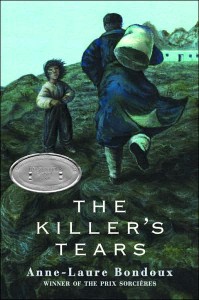 In our final week featuring controversial books, we spotlight The Killer’s Tears written by Anne-Laure Bondoux and translated by Y. Maudet. In this novel, Paolo is brought up by the man who killed his parents until another man arrives who vies for paternal influence. When all three are forced to leave their Chilean farm, they confront their past and their destinies are shaped.
In our final week featuring controversial books, we spotlight The Killer’s Tears written by Anne-Laure Bondoux and translated by Y. Maudet. In this novel, Paolo is brought up by the man who killed his parents until another man arrives who vies for paternal influence. When all three are forced to leave their Chilean farm, they confront their past and their destinies are shaped.

